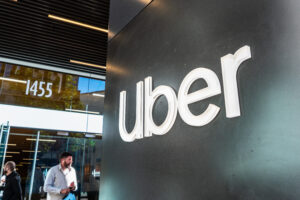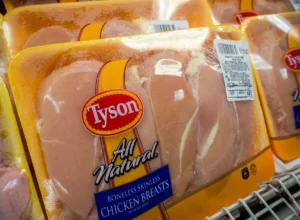By Donald Shaw and David Moore, Sludge
Heading into a re-election contest next year, Texas Republican Sen. Ted Cruz is trying to position himself as a leader of the Republican Party’s rebrand as a populist force on the side of the working class. In July, Cruz proclaimed, “Today’s Republican Party is a blue-collar party. We’re the party of working men and women.”
Cruz took his populist rhetoric a step further in his address at the Conservative Political Action Conference (CPAC) last year, saying, “Big is bad, across the board… big business sucks.” In an August newsletter, Cruz took aim at one big business industry in particular. “Big Tech companies have a profit model that they’ve discovered marketing to teenagers and even younger than teenagers—marketing ideas that are addictive, getting them hooked,” Cruz wrote.
While he swigs beer with Texas ranchers in appearances on Newsmax, Cruz is on pace to raise millions of dollars for his 2024 race from finance donors. According to OpenSecrets, Cruz raised $4.59 million from the finance, insurance, and real estate (FIRE) sector in his previous election cycle and another $1.5 million so far this cycle—with much of his election-year fundraising still to come. The FIRE sector is by far Cruz’s largest donor sector of the economy, according to OpenSecrets. Of donors in that sector, individuals and PACs affiliated with the securities and investment industry have given him more than half a million already this election cycle.
Cruz’s large securities industry donors this year have included Drew McKnight, CEO of Fortress Investment Group, who together with his spouse donated a combined $23,200, and Willie Langston, co-founder of Avalon Advisors, who donated $11,800. Some of his other securities industry donors include Apollo Management CEO Marc Rowan and spouse ($13,200), former Warburg Pincus senior advisor David B. Krieger ($14,400), BMC Investments founding partner and CEO Matthew Joblon ($1,000), Charles Potomac Capital CEO Joseph Popolo ($10,000), and Privateer Capital Management founder and CEO Reagan Reaud and spouse ($23,200).
Big Business PACs
Cruz has already raised more PAC money in the 2024 cycle than he did in his previous cycle, according to OpenSecrets. Since the start of 2019, he has raised $1,860,254 from PACs, while in the cycle from 2013 through 2018, he raised $1,578,067 from PACs. These figures include donations from PACs affiliated with companies, trade associations, members of Congress, and ideological groups.
A review of Federal Election Commission records shows that Cruz’s campaign and leadership PAC have received donations this year from the PACs of trade groups that represent some of the biggest companies in the country. The American Bankers Association gave Cruz $2,500 in June. It represents JPMorgan Chase, the 23rd-largest American company, along with all the other large American banks. NCTA, a trade group representing telecommunications giant Comcast, donated $5,000 to Cruz in June. Apple and Amazon, among the largest companies in the world, are members of the trade group CTIA, which has given Cruz $4,500 this year.
Many of the large companies that these trade groups represent have found themselves at the center of antitrust-adjacent disputes in recent years. Apple and Amazon would both be subjected to new regulations under Democratic tech-focused antitrust legislation. This week, the Federal Trade Commission and 17 state attorneys general initiated a lawsuit against Amazon alleging that the company engages in a range of illegal tactics to stifle competition. Comcast has battled attempts by Democrats to enforce net neutrality rules, which would prohibit it from using its monopolistic power to limit competition through throttling content or prioritizing its own content through practices such as zero rating. In late August, JPMorgan Chase and other American Bankers Association members Goldman Sachs, Morgan Stanley, and UBS agreed to pay $499 million to settle a lawsuit alleging that they colluded in violation of antitrust laws to rig the stock lending market in 2009.
Fortune 500 companies whose PACs have donated to Cruz already this year include Enterprise Holdings, TD Bank, Apache Corporation, and Tenet Healthcare. Lobbying firm Brownstein Hyatt Farber Schreck donated $8,000 to Cruz by way of its PAC. Brownstein is the largest lobbying firm in D.C. with more than 280 clients including companies and trade associations such as the U.S. Chamber of Commerce. The PACs of law firms Holland & Knight, which lobbies for Alphabet subsidiaries Waymo and Wing, and Cozen O’Connor, which lobbies for Amazon, among others, gave a combined $5,000 to Cruz’s campaign this year.
Fighting Consumer Watchdog Agencies
Cruz, the ranking member of the Committee on Commerce, Science and Transportation, has kept up a stream of criticism of the Federal Trade Commission under the leadership of Lina Khan. Two weeks ago, he sent her a letter expressing concern that she was seeking to regulate the artificial intelligence industry over its design rather than addressing a specific harm to consumers. Last month, he sent Khan a letter criticizing her work with the European Union regarding tech industry regulations. In March, Cruz kicked off an investigation into the Federal Trade Commission’s investigation of Elon Musk’s takeover of the company formerly called Twitter.
In April, Cruz reintroduced a bill to eliminate the Consumer Financial Protection Bureau, an agency that among other things has issued guidance to prevent banks from charging surprise overdraft and depositor fees. Consumers had been paying approximately $8 billion annually in overdraft fees in recent years, an amount that has been declining since the pandemic.
In June, Cruz was one of 32 senators to sign a letter to President Biden calling on him to withdraw Department of Labor Secretary Julie Su as a nominee. A former California Labor Secretary, Su’s nomination is supported by unions including the AFL-CIO and civil rights groups like the Leadership Conference on Civil and Human Rights.
Cruz recently received his first contributions from billionaire hedge fund founder and activist investor Nelson Peltz, chairman of the board of fast food chain Wendy’s. The Palm Beach, Florida-based Peltz and his wife Claudia gave more than $23,000 to Cruz’s campaign and leadership PAC on June 29. Over the past several years, Peltz has rejected calls from the farmworkers organization Coalition of Immokalee Workers for Wendy’s to join the Fair Food Program for safer working conditions, a step taken by other corporations like Walmart and McDonald’s. Also in June, Cruz’s campaign took in $6,000 from Republican megadonors Richard and Elizabeth Uihlein, major funders of conservative legal and policy groups that supported right-to-work laws, including through Supreme Court cases like Janus v. AFSCME, decided in 2018.
Cruz is banking campaign donations this year from billionaire investors who have been major donors to super PACs that backed his last re-election with millions of dollars in ad spending. And his campaign is seeing money roll in from PACs representing big business interests that lobby against the Biden administration agenda on issues like “junk fees” shelled out by consumers.
Cruz’s 2018 re-election, by a margin of 2.6 points, was aided by more than $9.2 million in outside spending backing his bid and opposing O’Rourke. Nearly $1.2 million of that amount came from the super PAC of the conservative Club for Growth, which that cycle was bankrolled by top donors Uihlein and billionaire investor Jeff Yass. This year, Club for Growth’s super PAC started spending in August on direct mail in Cruz’s re-election race, according to FEC records. The anti-tax group’s agenda in Washington D.C. calls for eliminating the individual capital gains tax and corporate income taxes, ending the federal government’s role in education, and slashing Social Security and Medicare. Private equity billionaire John W. Childs, like Uihlein a donor to Club for Growth’s super PAC ($250,000 so far this cycle), steered $5,800 to Cruz in April.
Among the Texas Democrats who have announced Senate bids are Dallas area Rep. Colin Allred, who was elected in 2018 to the U.S. House, and Uvalde area state Sen. Roland Gutierrez.



